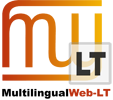(EU Project Name: LT-Web. MultilingualWeb-LT is the external brand of the project.)
One of the main obstacles that currently prevent effective integration of language technologies (like machine translation) into mainstream web technologies is that there is a lack of standardised "information about the content" (metadata). In other words, language technologies are applied "blindly" without clear background knowledge about the content that is being processed, and without leaving a "trace" about the processing steps already performed on the content. Because of the lack of a commonly accepted systematic approach to describe the content and the processing steps, a lot of valuable information is lost.
The objective of MultilingualWeb-LT (Multilingual Web - Language Technologies) is to demonstrate how such metadata can be encoded, maintained and exploited in various processes (e.g. localization workflows and frameworks like okapi, machine translation, or content management systems like Drupal).
Rather than taking a theoretic and institutionalized standardisation approach, LT-Web intends to set up reference implementations with real-life systems and real users, where the value of metadata is concretely demonstrated. The resulting conventions and findings will be documented and published as a W3C standard, with the necessary documentation, data and test suite, as required by the W3C standardization process.
Partners
- Trinity College Dublin, Ireland
- Dublin City University, Ireland
- Moravia Worldwide, Czech Republic
- University of Economics Prague, Czech Republic
- Microsoft Ireland Research, Ireland
- Enlaso, USA
- Jožef Stefan Institute, Slovenia
- University of Limerick, Ireland
- Cocomore AG, Germany
- Linguaserve, Spain
- VistaTEC, Ireland
- Lucy Software, Germany


